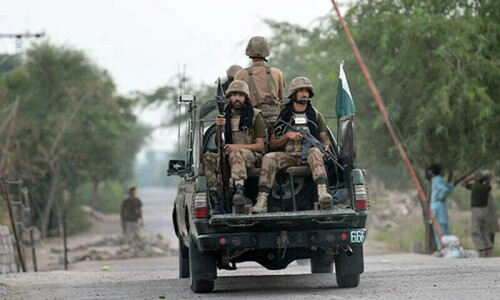ISLAMABAD: Adviser on Foreign Affairs and National Security Sartaj Aziz said on Tuesday that the country was steering clear of problems in the turbulent Northeast Asian strategic triangle by simultaneously developing relations with China, Japan and South Korea.
“We are not only deepening our ties with China but also reinforcing our bilateral relations with all East Asian nations, including Japan and RoK (South Korea). We have a separate bilateral track with the US, which is playing an active role in the Asia Pacific and South Asian regions,” he said while inaugurating a conference at the National Defence University.
Long time allies Pakistan and China are seeking to further solidify their relationship by forging stronger defence and security ties, continuing nuclear energy cooperation and expanding trade. The two countries last week rechristened their ties as an ‘all weather strategic cooperative partnership’ while inaugurating $45 billion economic corridor projects during Chinese President Xi Jingping’s trip to Islamabad which was described as historic by both sides.
Also read: PM Nawaz hails strong China-Pak relations
The new phase in relations with China had brought its own challenges with respect to the ties with other countries in East Asia, particularly South Korea, Japan and Asean.
Relationships between China, Korea and Japan have been marred by maritime territorial disputes and historical legacies from the World War II. China and Japan dispute the sovereignty of the Diaoyu/Senkaku Islands, while Japan and South Korea have their problems over Dokdo/Takeshima Islands.
Meanwhile, the United States is reasserting it presence in Asia-Pacific to counter China’s rise.
Lately, there have been moves for normalising the relations the in China, S. Korea and Japan triangle. But Mr Aziz cautioned that maritime disputes were not the only cause of tensions in the region.
“Other issues include the shaping of the new world order, including the composition of the reformed Security Council and industrial competition between China and Japan. The Korean peninsula is eerily volatile though it is calm for the time being. Divergences over the disputed islands in the South China Sea pose even more scary security challenges. These scenarios are compounded by widely perceived Indian ambitions to play a major power role in the region and to contain China,” the adviser said.
“Against this strategic and economic backdrop, Pakistan is making its choices prudently and with confidence,” he said, adding that Islamabad was for peaceful co-existence and economic development in Asia-Pacific instead of making it “an arena for strategic competition and Byzantine schemes”.
Mr Aziz recalled the growing cooperation between Pakistan and Asean -- a political and economic grouping of Southeast Asian countries and reiterated the country’s desire for full membership of the bloc.
“We want to become a full dialogue partner of Asean,” he said.
Pakistan has been a sectoral dialogue partner of Asean since 1993. In 2004, Pakistan acceded to the Treaty of Amity and Cooperation in Southeast Asia and joined the Asean Regional Forum (ARF). In 2005, Asean and Pakistan signed a Joint Declaration for Cooperation to Combat Terrorism.
Trade between Pakistan and Asean countries touched $6.3 billion in 2013, which is heavily tilted in favour of the latter. Foreign investment in Pakistan from Asean has also been growing.
Mr Aziz listed Pakistan’s priorities in relations with Asean saying: “We are now paying special attention to expand our relations with Asean in trade, industry, investment, science and technology, drugs and narcotics, environment, tourism, and human resources development.”
He said cooperation between Pakistan and Asean countries at the multilateral forum was strong and had the potential of becoming stronger.
“The Asia-Pacific is an important region in global decision-making at the UN, UN-related organisations and international financial institutions. Pakistan needs their support on UN reform, peacekeeping, disarmament issues, international finance, post-2015 development agenda, climate change, human rights and elections to the UN and other international bodies. “Our bonds with the Asia-Pacific states in these fora are strong; we will work to make them stronger.”
Published in Dawn, April 29th, 2015
On a mobile phone? Get the Dawn Mobile App: Apple Store | Google Play















































